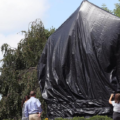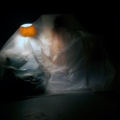Undone by One Another

About a week into winter term, Zelda, a two-year old Pitbull mix who had been found abandoned in the high desert, gave birth to a litter of eight puppies. The student who found her left our weekly Public Speaking gathering to attend her delivery, which was taking place in his dorm room. Zelda did not enter easily into motherhood. Admittedly, the conditions were not ideal: she and the puppies were moved to a large closet in the dorm, and you could sense—or I imagined I recognized—her wild oscillations between desperately ferocious protectiveness and an equally desperate (and ferocious) frustration about her containment. A couple of weeks after the birth I watched her, a handful of puppies hanging off of her nine strikingly pink nipples, step purposely over a raised curb to scrape her babies off.
At that time my own baby, at two-and-a-half, was doing quite a bit of her own hanging—on the backs and legs and arms of my students. We were spending the semester at Deep Springs College: an educational experiment in an otherwise not humanly occupied valley on the California-Nevada border, the liberal arts school/community/alfalfa farm/cattle ranch was founded in 1917 to train young men for “lives of service.” My husband and I were two of the six resident faculty members, each teaching a class and living in an apartment just on the other side of the walk-in pantry from the kitchen where the students cook the meals the community shares.
Outside the classroom I would watch as my child’s sticky hands tried, maybe, to interrupt the mouth of a student who was gently reasoning with her, wondering idly if and how I should intervene. In her contribution to The Grand Permission, Mary Margaret Sloan writes this of the kind of communication that grows up between the mother and her newborn: “The terms of that exchange, constantly interpenetrating in the newly constructed space between them, undoes the mother’s oneness, violates her boundaries, and abruptly wrenches her perspective from the singular to the multiple.” Even as it undid me, I cherished that boundarilessness. But what happens when this other/not-other with whom you create and inhabit an amorphous space pushes at its edges, yanks other people in, defines new relations for you, who are now multiple?
My husband and I bring our two daughters with us: to campus, poetry readings, union negotiations, dinner with friends, protests. It’s not that we don’t do the “kid” things—they have certainly changed the activities and contours of the world and time we inhabit—but we try conscientiously to ferret out unnecessary distinctions, to build a communal life. In part, too, we bring them because if we don’t, we can’t go. It sounds like: a three-year old thrilled to go to a performance by Nathaniel Mackey and bassist Vatel Cherry and then snoring loudly in the quiet auditorium.
The first time I was pregnant, I was writing my dissertation and adjuncting at Hunter College. Spring semester ended a week before my due date. Responding to some deep sense of the imperative of female endurance, or maybe just prideful and with something to prove, I did not acknowledge my pregnancy to my students. Every week I grew larger and larger before their eyes, and still, I stood, my words clinging relentlessly to the debatability and scope of their paper arguments. They would come to my office hours and blurt out, “You’re pregnant.” Such a reasonable need for me to say the words.
I don’t think this early stoicism opposes my later openness, or that it holds some kind of teleological previousness in my development as a parent, person, teacher. Though, in many ways, teaching and living at Deep Springs did change me. It changed what I imagine a teacher’s authority is, where it comes from. It changed what I wanted from the intersections of my work and my life. It increased the actual rawness of the places from which I am willing to write, from which I am willing to admit that I write.
But even in this telling, it is all so seemly. Vulnerability made to feel curated like an aesthetic. Hindsight, the rehashing of experience, the essay’s construction, all paper over legitimate shame and confusion. My sweaty, tired body holding my child’s sweaty, tired body—one arm asleep, back painfully pinched, seat creaking, dozens of adults between us and the exit. My child’s food and mud and pee-stained body, her inappropriate remarks, her disruption of the space of study, my lack of control, my thorough distraction. I understand intuitively to—and how to—make a poetics of this. But making the life: of/a teacher, of/a mother, of/a writer. What does it really look like? What is the relationship between my early proud, pregnant silence and me watching my daughter cling to a loving but irritated young man’s neck: she is not listening to me, she is heaving her thrilled, dirty face into his face. I am trying to talk to the young man, my friend, my student, about—have been tasked with teaching about—poems and how their forms enact knowledge. What does it mean for my students to know me as a mother? Why does it matter?
When my first daughter was four years old, after two years of failed rounds of IVF (another shame, another telling), I was finally pregnant again. I was also on a plane to Missoula, where I was going—by myself—to spend the semester as the visiting poet at the University of Montana. My first morning there, I put on my new Sorrel snow boots and trekked to a charming coffee place near my carriage house. The owner, I learned from Yelp, was the mother of a five-year-old, and in an exaggerated response to some kindness I perceived in her face I confessed that I was there to be the poet. That I had come without my daughter. I left, and crossing the bridge to downtown felt the rush of cold air; the haze had started lifting and with it came the sudden, though limited, opening of landscape—just to the edge of the surrounding mountains. Everything rose up inside of me. And I had to choose, every few steps, whether to vomit where the bridge’s metal grate met the road and its close, passing cars, or to let it fly over the side into the river rushing below.
Those first several weeks in Montana I confessed my act of parental abandonment again and again: the yoga teacher, a sympathetic second-year poet. I was addicted to the sear of pain when I imagined—or rightly noticed—that what was passing my interlocutor’s face was the harshest judgment. Week two of seminar and I am reading the pages I have assigned from Claudia Rankine’s Plot:
Whether her eyes are open or closed she hears only a child.
Whether her eyes are open or closed she hears only the child.
Whether her eyes are open or close she sees only her child.
Whether her eyes are open or closed she sees only her own…
My class is called “Time” but unconsciously I teach so much mothering that one of the three undergraduates, who has been writing jarring, dark, drug-filled philosophical poems all semester, dedicates his final project to his mom.
I am flailing, cannot figure out who I am—teacher writer—without the presence of my child. When she comes and rustles her drawing papers (you can hear her, but it’s not too loud—parental decorum, curated vulnerability, just enough control) through a reading by another visiting poet, I feel a relief so complete it is almost painful.
I am in the classroom again and my body is another presence. Or three. There is me, teacher, there is me, mother, and there is the baby inside me, who is kicking; I touch where she kicks. It is summertime now and my family is reunited. We are in western North Carolina and my husband and I are co-teaching the seminar at the Arete Project. Another pedagogical experiment, this one for women, Arete is “education towards its highest ends: the cultivation of wisdom, the living of a good life in thought and action, and selfless devotion to world and humanity.” We’re living a ten-minute walk up the dirt path from campus this time, in a cabin, porous and vermin filled. Our eldest is five and she sits under the picnic tables at dinner pinching ankles. She corrals the young women into demanding games. I turn from the table at which we are talking about Homer and two students are doing squat thrusts while my daughter paces, brandishing a long stick. I am due July 30, our term ends August 12. We joke that for the summer program’s labor component, the students should attend mine.
One night a student asks why I touch my belly in class. Is something happening? I take her hand and hold it to the bump and the baby responds. The student jumps back and screams.
The tremendous irony is that even teaching enormous at nine months pregnant it feels impossible to convince anyone that pregnancy and childbirth and motherhood are not theoretical. Even if they can see. Even if you say the sentence. Even you search for even more words to tell them, daily, how you are feeling. We are teaching all afternoon, preparing all morning. Sometimes we walk through the forest with our large, anxious dog (one of Zelda’s scraped-off offspring) and our daughter, who is getting more and more difficult to get to bed. It is too hot and too close everywhere. We bring a fan into the classroom but it is too loud to hear. Every afternoon it rains on the clothes we forget to bring in from the line. One day I am staring at a student, and I can’t find her name. I feel undone by the blank and by the searching. The room goes still as I stare at her and stutter. I am exhausted. I am not eating enough. Each week the midwife weighs me and asks when I will stop teaching. (It is hard to tell the story without imagining and inscribing some version of self-abnegating heroics.)
How can I be there for my students, myself, my child, my almost-child? Our time in the classroom was beautiful and moving—we read Fred Moten and studied together. We talked and listened and many of us cried and we lived together. But my negotiations (mother, teacher, writer) led to actual failures. I gave birth finally on August 10 and we missed almost all of the final presentations. In my house, months later, there are student projects I have not commented on or returned. What does it mean for my students to know me as a mother? Why does it matter?
And still the telling is too seemly.
For the entirety of my life as a mother I have also been a teacher. As a teacher I have been a contingent faculty member. I went to Hunter and Deep Springs and Montana and Arete because I believed in their missions, their visions of learning and doing, because they represented exciting opportunities for me intellectually, creatively, humanly. But I also went because we are cobbling together a living from temporary appointments. When my first daughter was three, she had lived in four states, even more houses. The messy facts: the legitimate shame and confusion of my sweaty tired body are not unlike the messy facts, the shame and confusion of professional and financial insecurity. Especially when it is confessed within relationships predicated on some version of authority. One reason I believe that this connection is sound is because I don’t think what I want my students to see or understand about my motherhood is its content.
Judith Butler writes, “Many people think that grief is privatizing, that it returns us to a solitary situation and is, in that sense, depoliticizing. But I think it furnishes a sense of political community of a complex order, and it does this first of all by bringing to the fore the relational ties that have implications for theorizing fundamental dependency and ethical responsibility.” Motherhood has its share of grief—and ridiculousness and disgust and joy. But where I think it speaks most to these lines of Butler’s is in how it forces you to look at, to make something of and from, those constituting relational ties, with their messes and tendernesses and power dynamics.
There’s that thing folks say to young people, about how they’ll understand better when they have their own children—they’ll trade in their idealism for realism; for the good of their families they’ll make what might seem like selfish choices. I have never found anything to be less true. My children make me as they unmake me. And from the amorphous space we inhabit together, they re-draw my boundaries with my world. They re-imagine my world. They make noise in it. And we are not alone in it.
For me, motherhood has shared much with teaching. Because, “let’s face it,” as Butler writes, “We’re undone by each other. And if we’re not, we’re missing something.”
About Stefania Heim
Stefania Heim is the author of the poetry collection A TABLE THAT GOES ON FOR MILES (Switchback Books 2014) and a Poetry Editor at Boston Review. Her poems, essays, and translations (most recently of metaphysical artist Giorgio de Chirico's Italian poems) have appeared in venues including A Public Space, Aufgabe, Harvard Review, Jacket2, The Literary Review, Pinwheel, and Poetry International. She currently works as a Lecturing Fellow in the Thompson Writing Program at Duke University.





